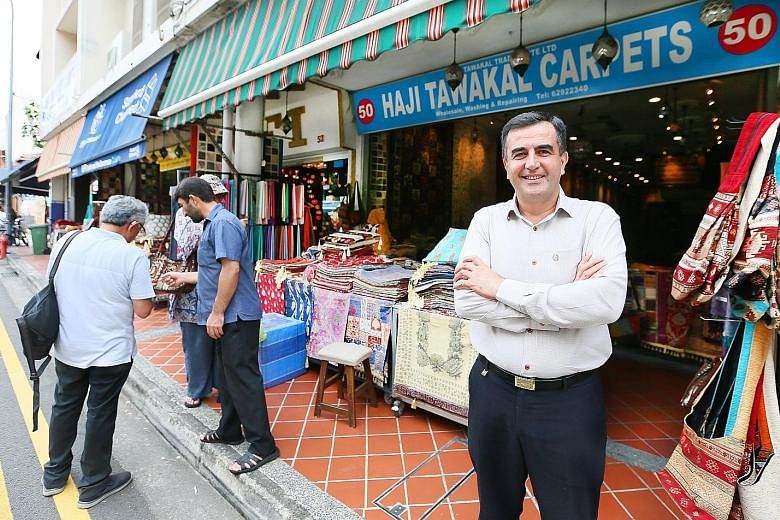An Iranian-born businessman is working with the Singapore Tourism Board to roll out free Wi-Fi and a digital map, and also wants to bring more traditional music, arts and fashion events to Kampong Glam.
In the last three years, One Kampong Gelam (OKG) founder and chairman Saeid Labbafi has helped boost the Kampong Glam area's charm with restaurants and cafes, complete with the obligatory hipster barista.
Earlier this month, Mr Labbafi, 49, won the Urban Redevelopment Authority's annual Place Champion Award for his efforts. These include spearheading the regular weekend car-free zones that have led to a rise in footfall in the area.
Several roads, including Bali Lane, Haji Lane, Baghdad Street and Bussorah Street are transformed on weekends into car-free zones for community activities, bazaars and outdoor dining.
Last month, OKG initiated its first precinct-wide car-free zone in conjunction with the Aliwal Arts Night Crawl. Visitors were treated to silat shows, Malay dance performances and community yoga.
OKG has about 70 members, all of them businesses.
Mr Labbafi is not done yet. With more than 600 stakeholders in the area, he hopes to get almost all of them on board a pilot Business Improvement District scheme, which the Government announced earlier this month.
The scheme aims to encourage ground-up efforts to spruce up districts, and the Government will give groups of businesses matching grants of up to $500,000 a year, over four years, for a total of up to $2 million. Mr Labbafi said he is talking to business owners about the potential benefits.
With the help of funding for the scheme, he has plans to make Kampong Glam more attractive - with traditional floor tiles and road signs, green spaces and public seating areas. Having more, and maybe even permanent, road closures would facilitate this, he said.
Speaking to The Straits Times at Haji Tawakal Carpets last week, the Teheran native said he came to Singapore as a carpet wholesaler in 1994, attracted by the prospect of a "good market". He later opened carpet shops in Kampong Glam in 2004 , drawn to the area's rich heritage, and driven by a desire to know the local community better.
The area's long-time businesses include textile merchants, stalls selling souvenirs and nasi padang stalls.
Mr Labbafi, a Singapore permanent resident who holds dual Iranian-US citizenship, is married to a fellow Iranian, a housewife. They have a son, 11, and a daughter, nine.
While he has been able to draw people to the area, it has not been all rosy for his own business.
Mr Labbafi said his carpet retail and wholesale business has seen a 30 per cent to 40 per cent slump since the mid-1990s. Just two months ago, he closed one of his shops in Arab Street. He and his family now own eight carpet shops in Arab Street.
Tastes have changed, he said.
In Iran, carpets can be found in every home. He said: "You have your children crawling over the carpet, birthdays happening on it, and as you grow older, you appreciate the artwork."
Mr Labbafi has seven Persian carpets in his home in Singapore.
People also now buy furniture before getting the carpets.
Said Mr Labbafi: "In the past, the carpet was the first thing you bought. People appreciated carpets as a piece of art, and they tried to accept the carpet for what it was. Today, they want the carpet's colour to match the furniture they have."
The carpets in his shops generally cost between $1,000 and $5,000, although antiques or collectables can cost much more.
Most are hand-woven and knotted by weavers in places like Iran, Turkey, Afghanistan, Kashmir and Pakistan, said Mr Labbafi, and each one often takes a year - sometimes even four - to complete.
Each carpet has stories woven into it. Pointing to a $10,000 carpet on the shop's wall depicting the "Tree of Life" in Persian mythology, Mr Labbafi said: "The roots of the family come to the tree, and no matter how far the branches are spread out, they are still united."
Most people do not know much about fine carpets. Even fewer people have specialist knowledge, for instance, of the difference between a Persian and Kashmir carpet. That may be partly why not many are willing to spend a lot on a carpet.
Mr Labbafi started running free carpet appreciation classes about a decade ago, and more than 1,000 people have attended so far. His shops also sell some cheaper machine-made carpets from Belgium.
Also, online shopping has led many customers to compare the cheaper prices of online products with those sold in his shops but such comparisons are inaccurate.
There may be differences in quality that customers could be unaware of since they cannot check the feel of the carpets sold online, Mr Labbafi said.
He hopes to turn Singapore into South-east Asia's "carpet hub".
He said: "Every product made by hand should be supported. A handmade product can never be replaced by technology... It's not too late. It is our responsibility to keep the industry alive."


